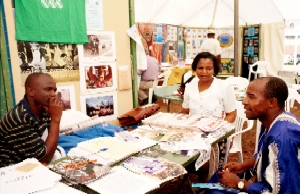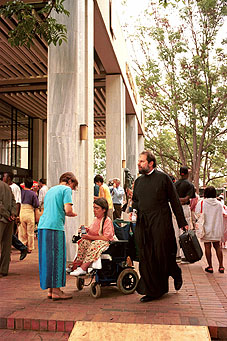Shona singing and drumming heralded a Differently-Abled
Persons event held at the World Council of Churches Assembly in Zimbabwe Wednesday (9
December). Members of the Siyeza Drama Group, a Bulawayo-based community arts programme
for young persons, presented an original play, "A Time to Change", aimed at increasing awareness
of the needs of children, women and men with physical and developmental disabilities.
The play, performed by an eight-member ensemble, focused on the issue of discriminatory
employment practices, and challenged the audience to "change your attitude" about persons with
disabilities, recognizing them as full human beings.
The event was part of the Eighth Assembly's Padare, a showcase of concerns by 400 Christian
groups. The Padare facilitator, Peter Mawindo, an adviser to the WCC, said that persons with
disabilities are marginalised and therefore more vulnerable to the effects of poverty and economic
crisis.
"We hope to get the message out through drama," said Mawindo, adding that the issue of disabilities
has yet to be addressed fully by the WCC.
 to full text
to full text




